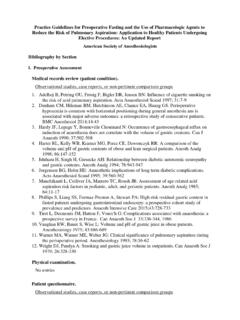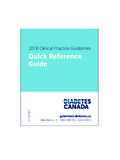Transcription of Step-Wise Dosing and Titration of Insulin for Type 2 ...
1 Insulin When to start Starting dose Average fasting AM BG Goal<130 Average Pre-lunch BG Average Pre-supper BG Average Bedtime BG Adjust Insulin dose every 3 days until BG < 130, or optimal dose is reached When to Change to Different Regimen Recheck A1C every 3 months Lantus (glargine) OR Levemir (detemir) OR NPH Insulin A1C greater than 8% on 2 or 3 antidiabetic agents OR 1 or 2 agents if Serum Creatinine greater than 2 10 units or up to units/kg SQ at bedtime (DC sulfonylurea if part of regimen) Greater than 130 mg/dL Increase dose by 2-4 units at bedtime. Optimal long acting (basal) Insulin dose keeps bedtime and AM fasting glucose values consistent. If after 3 months if A1c is greater than 7% and optimal bedtime dose has been reached with fasting blood glucose at goal, consider adding a pre-meal bolus Insulin at the largest meal of the day, pre-meal bolus Insulin at each meal or 70/30 premix Insulin . DC all oral agents except Metformin.
2 Pre-meal bolus with rapid acting OR regular Insulin AND Lantus (glargine) OR Levemir (detemir) OR NPH Insulin A1C greater than 7% with optimal long acting (basal) Insulin . 2-4 units of rapid acting or regular Insulin SQ at each meal (base dose) with +2 or +1 sliding scale depending on sensitivity. (correction) Greater than 130 Increase long acting (basal) Insulin dose by 2-4 units at bedtime Greater than 130 Increase AM rapid/regular Insulin dose by 2-4 units. Greater than 130 Increase lunch rapid/regular Insulin dose by 2-4 units. Greater than 130 Increase supper rapid/regular Insulin dose by 2-4 units. Pre-mix 70/30 Insulin A1C greater than 7% on maximized long acting (basal) Insulin . Alternative to long acting Insulin with premeal boluses for patients who prefer not to exceed 2 injections/day Calculate units/kg/day body weight (called total daily dose) AM dose = 2/3 of total daily dose before breakfast Greater than 120 150-250 Increase AM dose by 3 units.
3 Greater than 250 Increase AM dose by 5 units. Less than 120 Greater than 150 Consider changing to Custom-mixed NPH & Regular PM dose= 1/3 of total daily dose before supper. 150-250 Greater than 150 Increase PM dose by 3 units. Greater than 250 Increase PM dose by 5 units. Greater than 150 Less than 150 Consider changing to Custom-mixed NPH & Regular This serves as a guideline. Physician discretion to be used for management. Developed by DITTO Team, J Hariharan MD, I O Shaughnessy, MD, Debbie Gillard RPH, L Guddie, RPH - 2006 Step-Wise Dosing and Titration of Insulin for Type 2 Diabetes in the Ambulatory Setting last update 5/2010 Outcome Measure (ABC' ) Optimal Less Optimal Poor Control A = A1C Less than - 9 or Greater B = blood pressure Less than 130/80 C = Cholesterol - LDL Less than 100 CAD < 70 100 - 130 Greater than 130 D = Diet, as directed Optimal: Carbohydrate counting, food exchange, eating fruits and vegetables instead of fried foods E = Eye exam Exercise regularly Optimal: Annually F = Foot Exam Comprehensive, Patient check daily Optimal: At every visit.
4 Comprehensive, Annually G = glucose Monitoring Optimal: As directed H = Healthy living using action plan to achieve self -management goals Optimal: getting active, healthy diet, medication knowledge, checking blood glucose , daily foot checks, quit smoking I = Immunizations Influenza Pneumococcal Optimal: Flu vaccine annually unless contraindicated Pneumococcal vaccine once at diagnosis and repeat once after age 65 J = Join a smoking cessation program Optimal: Quit smoking K = Kidneys; microalbuminuria, creatinine Optimal: Annually Insulin When to start Starting dose Average fasting AM BG Goal<130 Average Pre-lunch BG Average Pre-supper BG Average Bedtime BG Adjust Insulin dose every 3 days until BG < 130 Custom-mixed NPH and Regular Insulin Failed above pre-mix 70/30 regimen Calculate units/kg/day body weight (total daily dose) AM dose = 2/3 of total daily dose given as custom-mix: 2/3 NPH and 1/3 Regular before breakfast 150-250 Increase AM NPH dose by 2 units.
5 Greater than 250 Increase AM NPH dose by 4 units. 150-250 Increase AM Regular dose by 2 units. Greater than 250 Increase AM Regular dose by 4 units. PM dose = 1/3 of total daily dose given as custom-mix: 1/2 Regular before supper (PM) and 1/2 NPH at bedtime (HS). 150-250 Increase PM Regular dose by 2 units. Greater than 250 Increase PM Regular dose by 4 units. 150-250 Increase HS NPH dose by 2 units. Greater than 250 Increase HS NPH dose by 4 units. ABC s of Diabetes Management Step-Wise Dosing and Titration of Insulin for Type 2 Diabetes in the Ambulatory Setting last update 5/2010











